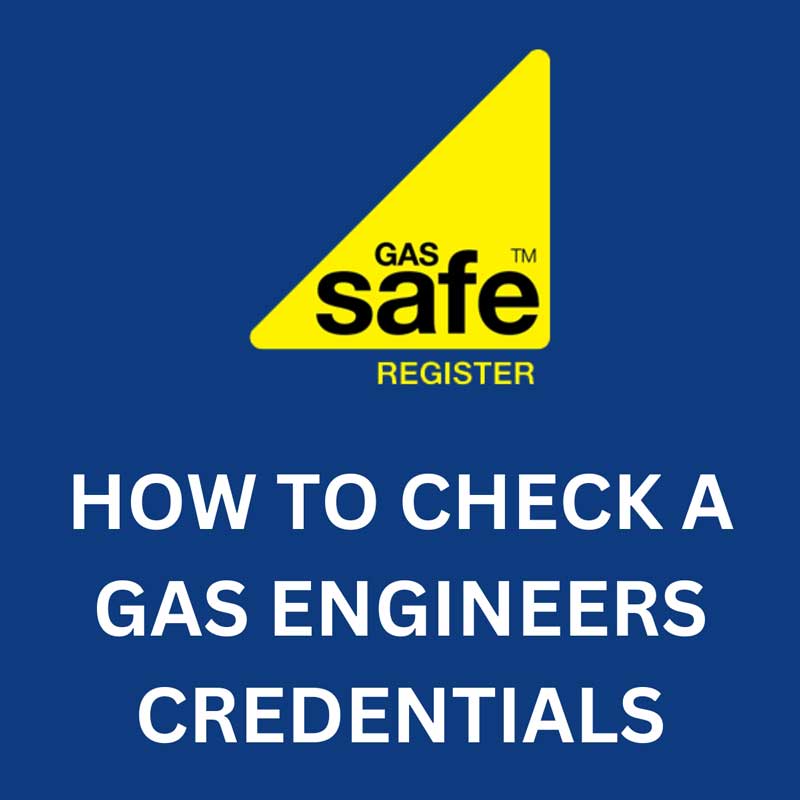
Gas safety is of paramount importance for every household in the UK.
Checking a gas engineer’s credentials and registering Gas Safe before working in your home or business is part of gas safety.
As homeowners, landlords, or tenants, we must ensure that any gas work in our properties adheres to the highest safety standards.
This is where the Gas Safe Register comes into play.
The Gas Safe Register is the UK’s official list of gas engineers legally allowed to work gas appliances and systems.
If someone is not on this register, they should not be working with gas.
This article will guide you through verifying a gas engineer’s credentials, ensuring they are Gas Safe registered, and highlighting why this is so critical for the safety of you, your family and property.
What Is The Gas Safe Register?
The Gas Safe Register is the gatekeeper for gas safety in the UK, ensuring that those who undertake gas work are competent, trained, and officially recognised.
History And Purpose Of The Gas Safe Register
Established in 2009, the Gas Safe Register replaced the previous regulatory body, CORGI, as the UK’s gas registration body.
The Health and Safety Executive (HSE) initiated the change to streamline and enhance gas safety standards across the country.
This register is not just a list but a commitment to protect the public from unsafe gas work.
The Role Of The Gas Safe Register
Being the UK’s only official gas registration body, the Gas Safe Register licenses qualified engineers to undertake gas work, ensuring that they meet the required safety standards.
Moreover, the register actively campaigns for gas safety awareness among the public, collaborating with stakeholders and the industry to raise standards and educate on best practices.
The Role Of The Health And Safety Executive (HSE) In Overseeing The Gas Safe Register
While the Gas Safe Register operates independently, its activities are overseen by the HSE, a national organisation that monitors health, safety, and illness at work.
The HSE ensures the Gas Safe Register adheres to rigorous standards and protocols to maintain and enhance public safety.
The Gas Safe Register is more than a name or a logo. It’s a symbol of assurance.
When you see the Gas Safe badge, you can be confident that the individual or business carrying it has undergone the necessary training regular assessments, and is competent to work safely and legally with gas.
Why Is It Important To Check A Gas Engineer’s Credentials?
The need for gas safety cannot be understated. Gas is a silent utility in our homes, working behind the scenes to provide us with warmth, cooked meals, and hot showers.
However, when mishandled, it can pose severe threats. This section highlights the importance of ensuring your gas engineer is Gas Safe registered.
The Risks Associated With Unregistered Or Unqualified Gas Engineers
- Gas Leaks: An improperly fitted or serviced gas appliance can lead to gas leaks, which can be fatal. Leaking gas can result in fires or explosions, endangering lives and property.
- Carbon Monoxide Poisoning: Often dubbed the “silent killer,” carbon monoxide (CO) is a colourless, odourless gas that can be released from poorly serviced or installed appliances. Inhalation can lead to severe health issues and even death.
- Faulty Installations: Unqualified engineers might not install appliances per the manufacturer’s guidelines, leading to inefficiencies, increased energy bills, breakdowns and invalid warranties.
Legal Implications For Homeowners And Landlords
In the UK, it’s illegal for anyone to undertake gas work without being Gas Safe registered. Homeowners and especially landlords have a legal obligation to ensure:
- Gas equipment and appliances in their properties are installed and serviced regularly by Gas Safe registered engineers.
- A valid, up-to-date gas safety record is maintained and provided to tenants.
Failure to comply can result in fines and imprisonment.
Moreover, insurance claims might be invalidated if an incident occurs due to negligence.
The Importance Of Regular Gas Appliance Checks And Maintenance
Even if an appliance appears to be working correctly, underlying issues may only be evident with a professional check. Regular maintenance ensures:
- Extended appliance lifespan.
- Improved efficiency, leading to energy savings.
- Early detection of potential problems, avoiding costly repairs or replacements in the future.
How To Check A Gas Engineer’s Gas Safe Credentials
The credentials of a gas engineer serve as a safeguard—a promise that the individual has the expertise, experience, and authority to work with gas appliances.
By ensuring that any engineer who works on your gas installations is Gas Safe registered, you’re prioritising the safety and well-being of everyone in the property.
Before allowing a gas engineer to work in your home or property, verifying their credentials is essential.
The Gas Safe Register has made this process straightforward, and by following these steps, you can ensure you’re placing your trust in the right hands.
Ask To See Their Gas Safe ID Card
Most Gas Safe Registered engineers will present their Gas Safe ID on arrival. Otherwise, ask to see their ID before they enter your property.
The features of a genuine Gas Safe ID card will include:
- A holographic Gas Safe logo
- The engineer’s photograph
- A start and expiry date
- A unique license number (which can be cross-referenced with the Gas Safe online database)
The back of the card lists the types of gas work the engineer is qualified to undertake. Ensure that the specific task you need aligns with their qualifications.
Use The Official Gas Safe Register Website Or Phone Them
Visit the official Gas Safe Register website and locate the “Check the Register” or a similar search option.
Alternatively, you can phone the Gas Safe Register to check.
Reliable Sources For Reviews And Feedback
While personal recommendations from friends, family or colleagues are invaluable, consider checking platforms like Trustpilot, Checkatrade, or Google Reviews for a broader perspective.
By following these steps, you ensure the safety of your property and loved ones and promote a culture of accountability and professionalism within the industry.
Remember, it’s better to spend a few extra minutes verifying credentials than to risk the dire consequences of unsafe gas work.
Warning Signs Of Unregistered Or Unqualified Engineers
Unregistered or unqualified engineers can pose serious threats, both immediate and long-term. Here are some warning signs to keep an eye out for:
Hesitancy to Show ID
A genuine Gas Safe registered engineer will always carry and willingly show their Gas Safe ID card when asked. If someone is hesitant, evasive, or outright refuses, keep them from undertaking work at your property.
Significantly Lower Quotes
Be wary of lower than average quotes. Such pricing can indicate a lack of proper qualifications or an intention to cut corners.
Vague Or Evasive Communication
A qualified engineer should be able to explain their work, the reasons behind it, and any recommendations they might have. If you’re faced with vague explanations or your questions are dodged, proceed cautiously.
Rushed Work Or Pressure Tactics
Beware of engineers who rush through the job or use high-pressure tactics to get you to agree to additional, potentially unnecessary work.
No Association With A Recognised Company Or Business
While many reputable gas engineers work independently, it can be a warning sign if someone has no affiliation or references from any recognised company or business and cannot provide references from past clients.
Unprofessional Appearance Or Behaviour
While appearances alone shouldn’t be a determining factor, an unprofessional demeanour, including lack of proper tools, can indicate a lack of genuine qualification.
Pushback On Written Agreements
Any engineer unwilling to provide written estimates or agreements or one who insists on cash payments without receipts should be treated with suspicion.
Reporting Suspicious Activity
If you encounter or suspect someone of being an unregistered engineer, it’s essential to report this to the Gas Safe Register to prevent potential harm to others.
In essence, while trust is important, verification is non-negotiable when it comes to gas safety.
Always trust your instincts. If something feels off, it’s worth taking the time to double-check. Safety, after all, always comes first.
Gas Safe Registered Engineers You Can Trust
TM Hughes & Son are Gas Safe registered engineers who have been serving Essex residents for over three decades.
If you live in the county and require a Gas Safe Registered engineer you can trust, please get in touch.

Hi, I’m Terry, the founder and owner of TM Hughes & Son Gas Services
Please get in touch to book an appointment or receive a free, no-obligation quote
Call – 01245 830075
Email – info@tmhughesandson.uk
0% Finance
For Boiler Installations & Repair
